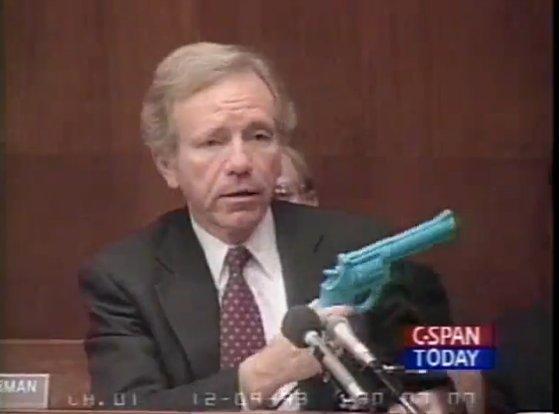This article originally appeared on Motherboard.Today president Donald Trump is going to meet with leaders in the video game industry after recently suggesting that violent games are partly to blame for mass shootings of the kind we saw in Stoneman Douglas High School in Florida last month.I don't care what Trump has to say about this because he has a record of making contradictory, incomprehensible statements that usually fail to result in tangible policy. It's better to wait and see what he does. I don't care what representatives from the Entertainment Software Association, the group that lobbies on behalf of video game companies, have to say either, unless they jump up on the Resolute desk and yell "gun control or death," which is both a plea and a factual statement.There's little evidence to support Trump's suggestion that violent video games cause mass shootings. As the ESA is happy to tell anyone who listens, there's plenty of evidence to the contrary. This has not prevented Trump's statement from resurrecting this tired scapegoat. I'm not surprised when the NRA blames video games. It's what it does. That's why it exists. But I was delighted to see a mainstream publication like CNN publish an opinion piece titled "If a possible mass shooter wants to hone his craft, don't hand him a virtual boot camp."It brings me back to a simpler time, when it was actually popular to think that video games turned kids into killers.People have been saying this for as long as there have been school shootings. The first-person shooter Doom got a lot of bad press in the 90s because the perpetrators of the Columbine massacre played it and talked about it online. At some point, relatives of people killed in Columbine unsuccessfully sued video game companies, claiming that without them, "this massacre would not have occurred."(Tangent: Donald Trump's brother, Robert Trump, sits on the board of Zenimax, parent company of the video game publisher Bethesda, which now owns Doom and its original developer id Software. Bethesda published some of the most violent video games ever made, like 2016's Doom, in which players stomp on heads until they explode, and perform various "glory kills," and Wolfenstein II, where players shoot Nazis, stab them in the chest with axes, and brutalize them in other creative ways. Is Robert coming to this meeting at the White House? Is he invited to Thanksgiving?)In 1993, people were so shocked by Mortal Kombat fatalities, Congress held hearings about them. Look at this plastic blue arcade gun Joe Lieberman was holding: He wanted to ban video games over this shit, lmao. Instead, we got the Entertainment Software Rating Board, a self-regulated rating system for video games I know for a fact parents ignore because every time I play Call of Duty I can hear 10-year-olds screaming the n-word over voice chat.In the 2000s, we had the anti-violent video game lawyer Jack Thompson, whose crusade against video games was so unsuccessful it somehow ended with him getting disbarred.After Thompson faded people were less worried about video games. There were other things to morally panic about, like smartphones, social media, and the internet in general.It's easier to morally panic about things you don't understand, and everyone understands video games now. As the ESA notes, 72 percent of the video game players are older than 18, and the average video game player is 35 years old. Sixty-five percent of American households are home to someone who plays video games regularly. They sell Zelda-inspired onesies on Amazon because gamers are having kids now. Video games are extremely normal, common, and not scary.There are plenty of new technologies to have a good moral panic about. Machine learning-generated fake porn. That fact there are so many videos being uploaded to YouTube every day, Google doesn't even know that neo-Nazis are using the platform to spread hate. That YouTube is algorithmically serving kids disturbing videos. Meme wars.Even in the world of video games, there are more novel things to worry about. Several states were so freaked out about the concept of loot boxes that, after the release of Star Wars Battlefront, senators threatened to regulate them (much like in 1993, the video game industry decided to regulate itself instead). What I wouldn't give to go back to a time before Gamergate, when the biggest problem with video games was that they were too violent.I wish this moral panic about violent video games would last forever. It's so simple, almost wholesome compared to the stuff we have to deal with today. Let's enjoy it while it lasts.
He wanted to ban video games over this shit, lmao. Instead, we got the Entertainment Software Rating Board, a self-regulated rating system for video games I know for a fact parents ignore because every time I play Call of Duty I can hear 10-year-olds screaming the n-word over voice chat.In the 2000s, we had the anti-violent video game lawyer Jack Thompson, whose crusade against video games was so unsuccessful it somehow ended with him getting disbarred.After Thompson faded people were less worried about video games. There were other things to morally panic about, like smartphones, social media, and the internet in general.It's easier to morally panic about things you don't understand, and everyone understands video games now. As the ESA notes, 72 percent of the video game players are older than 18, and the average video game player is 35 years old. Sixty-five percent of American households are home to someone who plays video games regularly. They sell Zelda-inspired onesies on Amazon because gamers are having kids now. Video games are extremely normal, common, and not scary.There are plenty of new technologies to have a good moral panic about. Machine learning-generated fake porn. That fact there are so many videos being uploaded to YouTube every day, Google doesn't even know that neo-Nazis are using the platform to spread hate. That YouTube is algorithmically serving kids disturbing videos. Meme wars.Even in the world of video games, there are more novel things to worry about. Several states were so freaked out about the concept of loot boxes that, after the release of Star Wars Battlefront, senators threatened to regulate them (much like in 1993, the video game industry decided to regulate itself instead). What I wouldn't give to go back to a time before Gamergate, when the biggest problem with video games was that they were too violent.I wish this moral panic about violent video games would last forever. It's so simple, almost wholesome compared to the stuff we have to deal with today. Let's enjoy it while it lasts.
Advertisement
Advertisement

